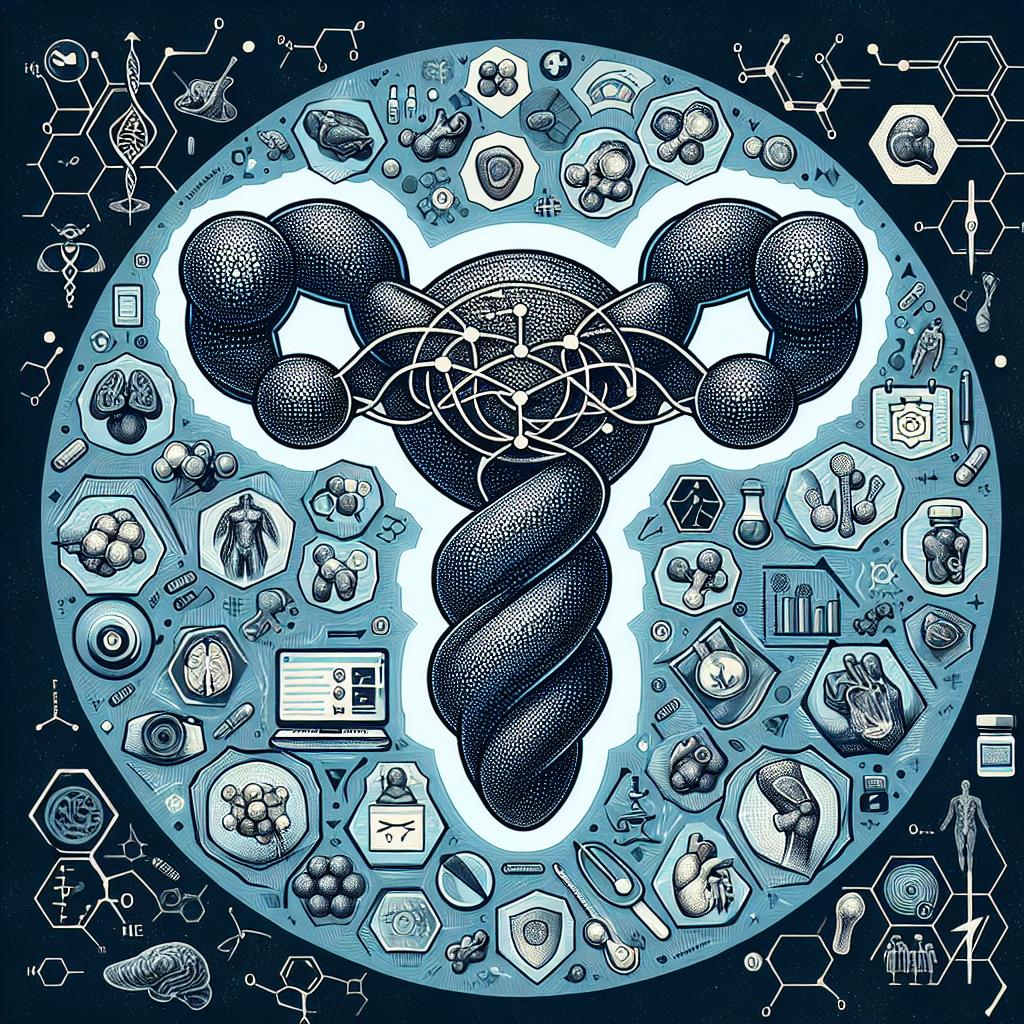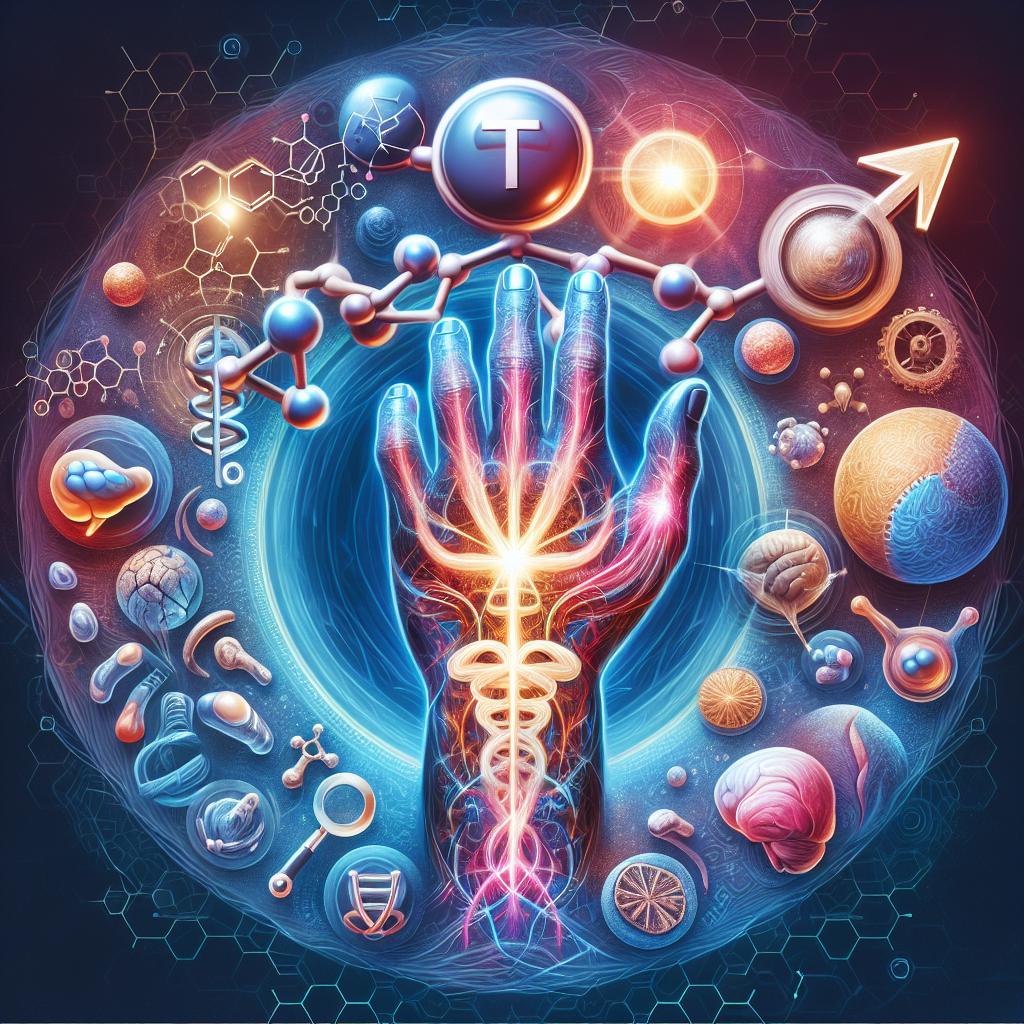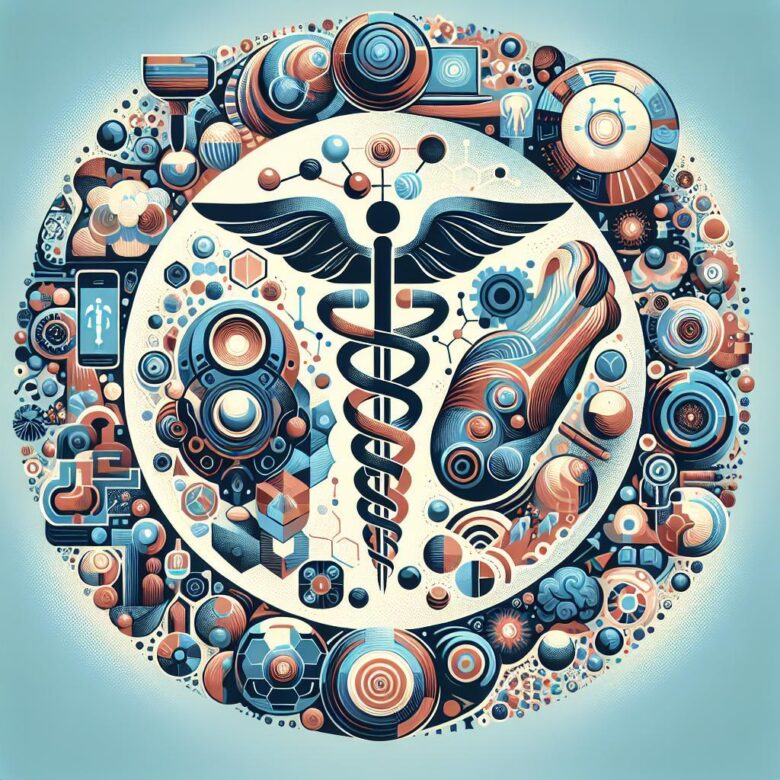As the world of medicine continues to evolve, new avenues are constantly being explored to alleviate the chronic pain and stiffness associated with arthritis. Among these avenues, a surprising contender has emerged: testosterone therapy. Traditionally associated with male health and vigor, testosterone’s potential therapeutic benefits for both men and women suffering from arthritis are gaining attention. This article delves into the cutting-edge research surrounding testosterone therapy, examining its role in managing the often debilitating symptoms of this inflammatory joint condition. By bridging the gap between hormonal health and joint care, we aim to shed light on how this misunderstood hormone might offer hope to millions living with arthritis. Join us as we explore the intersections of endocrinology and rheumatology, and consider whether testosterone therapy could be a game-changer in the fight against arthritis.
Understanding the Role of Testosterone in Arthritis Management
Testosterone is often associated with muscle growth and increased energy levels, but its implications go far beyond that, particularly in the realm of inflammatory diseases like arthritis. Research is emerging that indicates testosterone may potentially play a role in modulating inflammatory responses within the joints. Individuals suffering from osteoarthritis and rheumatoid arthritis have been observed to have lower testosterone levels, which highlights the hormone’s influence on the health of joints and the overall inflammatory process. By potentially reducing inflammation and promoting joint stability, testosterone therapy could afford some patients significant relief from the debilitating symptoms of arthritis.
However, the application of testosterone therapy is not without its complexities. The decision to initiate testosterone supplementation should be taken with caution and ideally in collaboration with a healthcare provider, considering both the potential benefits and risks. Patients may experience an improvement in their quality of life but must also be monitored for side effects, such as hormonal imbalances or cardiovascular concerns. A personalized approach, evaluating hormone levels and the specific type of arthritis, is essential to optimize the therapeutic outcomes. Below is a brief overview of factors to consider when looking at testosterone therapy for arthritis management:
| Factor | Consideration |
|---|---|
| Type of Arthritis | Different responses to testosterone depending on type. |
| Dosage | Individualized dosing is crucial to minimize side effects. |
| Monitoring | Regular assessments of hormone levels and health. |
| Comorbid Conditions | Consider potential interactions with existing health issues. |

Exploring the Benefits of Testosterone Therapy for Joint Health
Testosterone therapy has garnered attention in recent years for its potential to improve joint health, particularly for those suffering from arthritis. Although primarily associated with enhanced muscle mass and energy levels, testosterone also plays a vital role in maintaining bone density and joint function. In fact, studies indicate that lower levels of testosterone may contribute to increased inflammation, subsequently exacerbating joint pain and stiffness. By addressing these hormonal imbalances, testosterone therapy may offer a multifaceted approach to alleviate discomfort and improve overall mobility in individuals with arthritis.
Moreover, the benefits of testosterone therapy extend beyond mere symptom relief. Enhanced testosterone levels can promote:
- Reduced Inflammation: Lower cytokine production may lead to decreased swelling in affected joints.
- Improved Cartilage Health: Testosterone has been linked to the preservation of cartilage, essential for joint function.
- Increased Muscle Strength: With stronger muscles, there is less strain on the joints, potentially reducing pain levels.
Utilizing testosterone therapy may offer patients not only a path towards relief but also a holistic enhancement in their quality of life. As with any medical treatment, it’s crucial for individuals considering this option to consult with healthcare professionals to tailor the therapy to their specific needs and monitor potential risks. Through informed decision-making and appropriate management, testosterone therapy can become a pivotal aspect of a comprehensive strategy for joint health.

Evaluating the Risks and Considerations of Hormonal Treatments
When considering hormonal treatments such as testosterone therapy for arthritis, it is essential to navigate a landscape filled with varied risks and implications. These include physical health factors, emotional wellness, and societal perceptions. Potential side effects can manifest as increased aggression, mood swings, and skin issues, while medical risks may involve cardiovascular concerns and changes in blood chemistry. Regular monitoring and consultations with healthcare providers become paramount to ensure that any adverse effects are promptly addressed.
In addition to understanding the physiological effects, it is crucial to weigh the benefits against the drawbacks of hormone therapy. Beyond the physical parameters, patients should reflect upon their overall lifestyle and personal history. Key considerations include:
- Medical history: Pre-existing conditions can complicate hormone therapy.
- Age factors: Younger individuals might respond differently compared to older adults.
- Quality of life: Assess impact on daily activities and social interactions.
| Consideration | Importance |
|---|---|
| Regular Monitoring | High |
| Consultation with Specialists | Essential |
| Psychological Support | Valuable |

The Connection Between Testosterone Levels and Inflammation
Understanding the intricate relationship between testosterone levels and inflammation can provide valuable insights for managing conditions like arthritis. Research indicates that low testosterone may be linked to increased inflammatory markers within the body, which can exacerbate joint pain and swelling. Studies suggest that individuals with arthritis often exhibit lower testosterone levels along with higher levels of pro-inflammatory cytokines. This relationship hints at the potential benefits testosterone therapy might offer in mitigating inflammation and improving overall joint health.
Testosterone’s role in regulating inflammation rests on various mechanisms, including its influence on immune response and its ability to promote healthy muscular function. Some key points regarding this connection include:
- Hormonal Balance: Maintaining optimal testosterone levels can help balance immune function, potentially reducing inflammation.
- Muscle Mass: Testosterone is essential for muscle development, which plays a vital role in joint support and overall mobility.
- Impact on Mood: Adequate testosterone levels may improve mood and mental well-being, which can indirectly influence perceptions of pain and disability.
To further illustrate this relationship, consider the following table outlining the effects of testosterone on inflammation levels:
| Testosterone Level | Inflammation Status | Potential Effects |
|---|---|---|
| Low | High Levels of Inflammation | Increased discomfort and joint disease severity |
| Optimal | Balanced Inflammation | Enhanced well-being and reduced joint pain |

Integrating Testosterone Therapy into a Comprehensive Arthritis Care Plan
When considering testosterone therapy as part of arthritis management, it’s essential to integrate it thoughtfully within a broader care strategy. This approach should prioritize multimodal solutions that address both the physiological and psychological aspects of arthritis. Key elements to consider include:
- Patient Assessment: Evaluate testosterone levels, symptoms, and how they correlate with arthritis severity.
- Personalized Treatment Plans: Design individualized therapy tailored to the patient’s needs and underlying conditions.
- Monitoring Progress: Regularly check hormone levels and arthritis symptoms to gauge the effectiveness of therapy.
Moreover, collaboration among healthcare providers is crucial for maximizing treatment outcomes. Rheumatologists, endocrinologists, and primary care physicians should work together to ensure patients receive a holistic treatment plan. Consider incorporating the following strategies:
| Strategy | Description |
|---|---|
| Patient Education | Inform patients about benefits and risks associated with testosterone therapy. |
| Physical Activity | Encourage low-impact exercises that help maintain joint function and overall vitality. |
| Nutritional Support | Incorporate anti-inflammatory foods to complement hormone therapy. |

Advice for Patients Considering Testosterone Therapy
Considering testosterone therapy can be a significant decision for managing arthritis symptoms. Before proceeding, it’s essential to engage in an open dialogue with your healthcare provider, discussing your specific symptoms, medical history, and potential benefits versus risks of therapy. Understanding your body’s unique needs will help tailor a treatment plan that aligns with your health goals. Remember that testosterone therapy is not a one-size-fits-all solution; factors such as age, severity of arthritis, and overall health should inform your decision-making.
Additionally, it’s crucial to weigh potential lifestyle adjustments that may complement testosterone therapy effectively. Lifestyle factors to consider include:
- Dietary changes such as incorporating anti-inflammatory foods
- Regular exercise, tailored to your ability
- Stress management techniques like yoga or meditation
Tracking your symptoms and overall health can provide valuable insights, allowing for timely modifications to your therapy. Consider maintaining a journal to note any changes, both positive and negative, as this can support your healthcare team in optimizing your treatment.

Future Perspectives on Hormonal Interventions in Arthritis Treatment
As research continues to explore the intricate relationship between hormones and inflammatory conditions, the role of testosterone in arthritis treatment offers promising future directions. Emerging evidence suggests that testosterone may not only modulate the immune response but also possess protective properties against cartilage degradation. Potential pathways include:
- Anti-inflammatory effects: Testosterone may reduce cytokine production, thereby decreasing inflammation.
- Bone health promotion: Its anabolic effect on bone density can be crucial for patients with arthritis, often at risk for osteopenia.
- Muscle mass enhancement: Testosterone is known to aid in preserving muscle strength, supporting overall mobility in arthritis patients.
Looking ahead, clinical trials will be essential to delineate optimal treatment protocols, dosage regimens, and possible side effects of testosterone therapy in conjunction with traditional arthritis medications. Comparison studies could also help in understanding the efficacy of testosterone versus conventional treatments. Here’s a brief overview of what future studies might focus on:
| Study Focus | Potential Outcomes |
|---|---|
| Dosage Variability | Determining the most beneficial testosterone levels for different types of arthritis |
| Long-Term Effects | Exploring the sustainability of benefits and monitoring adverse effects over time |
| Combination Therapies | Assessing the synergy of testosterone with anti-inflammatory drugs and physical therapy |
Q&A
Q&A on Testosterone Therapy for Arthritis
Q1: What is testosterone therapy and how does it relate to arthritis?
A1: Testosterone therapy involves administering testosterone to individuals with low levels of this hormone. While primarily known for its role in male health and libido, emerging research suggests that testosterone may also influence joint health and inflammation, making it a topic of interest in arthritis management.
Q2: How might testosterone deficiency affect arthritis?
A2: Testosterone plays a vital role in muscle maintenance and bone density, which are crucial for overall joint function. Deficiency in testosterone has been linked to increased inflammation and worsened symptoms in some forms of arthritis, particularly in older adults. This connection has spurred interest in whether supplementation could help mitigate these effects.
Q3: What are the types of arthritis that could potentially be affected by testosterone therapy?
A3: Both osteoarthritis and rheumatoid arthritis have been investigated in the context of testosterone therapy. Preliminary studies suggest that low testosterone might contribute to the progression of these conditions, leading to speculation that therapy might offer benefits, especially for men suffering from arthritis symptoms.
Q4: Are there any studies supporting testosterone therapy for arthritis?
A4: Yes, some studies have indicated that testosterone therapy might help reduce pain and improve function in men with low testosterone levels and arthritis. However, research is still in its infancy, and more rigorous clinical trials are needed to establish definitive benefits and long-term effects.
Q5: What are the potential risks associated with testosterone therapy?
A5: As with any medical treatment, testosterone therapy carries potential risks. These can include increased cardiovascular issues, prostate health concerns, and sleep apnea. Therefore, it’s essential for individuals considering this therapy to consult with healthcare professionals who can assess personal health risks and monitor ongoing treatment.
Q6: How do patients typically respond to testosterone therapy?
A6: Responses vary by individual. Some patients report decreased pain, improved energy levels, and better overall physical function, while others may not experience significant changes. Personalized treatment plans and regular monitoring are crucial to determining the therapy’s effectiveness.
Q7: Who should consider testosterone therapy for arthritis?
A7: Men with diagnosed low testosterone levels who are experiencing arthritis symptoms may be candidates for testosterone therapy. However, a thorough evaluation by a healthcare provider is necessary to understand the potential benefits and drawbacks in the context of each patient’s unique health situation.
Q8: What are some alternative treatments for arthritis if testosterone therapy isn’t recommended?
A8: There are numerous alternative treatments available for arthritis, including physical therapy, corticosteroids, nonsteroidal anti-inflammatory drugs (NSAIDs), and lifestyle modifications like diet and exercise. Complementary approaches such as acupuncture and dietary supplements are also popular and can be explored in consultation with healthcare professionals.
Q9: Is more research needed in this area?
A9: Absolutely. The relationship between testosterone therapy and arthritis is complex, and while initial findings are promising, extensive and well-designed studies are necessary to fully understand its efficacy and safety for arthritis patients. As science advances, more targeted approaches to treating arthritis may emerge from this research.
Q10: Where can individuals find trusted information about testosterone therapy for arthritis?
A10: Individuals should look for reputable sources like medical journals, healthcare institutions, or professional organizations in rheumatology or endocrinology. Consulting with a healthcare provider can also guide patients to reliable information tailored to their specific circumstances.
Concluding Remarks
the exploration of testosterone therapy for arthritis unveils a complex interplay between hormonal health and joint function. As research continues to shed light on the benefits and potential risks, it is clear that this approach may hold promise for some individuals facing the challenges of arthritis. However, the journey toward understanding the full extent of testosterone’s role in managing this condition is still ongoing. Always consult with a healthcare professional before embarking on any treatment journey, as personalized care remains paramount. As we navigate the evolving landscape of arthritis management, the quest for innovative solutions, including hormonal therapies, inspires hope for a future where individuals can reclaim their mobility and embrace life with renewed vigor.










